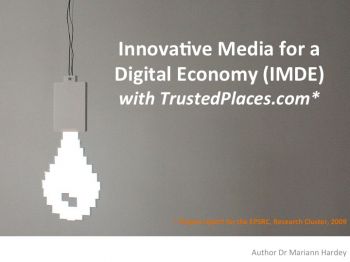Project report for the EPSRC, Research Cluster on Innovative Media for a Digital Economy (IMDE)

Download this presentation (7.9 MB)
What follows is a report that was commissioned by the IMDE and EPRSC in 2009 looking at consumer reviews to the UK review website TrustedPlaces. The report was in response to the calls from the cultural industry to understand consumer communication and commercial business as they seek to attach themselves to consumer-generated content that is on the web.
In the report I outlined the potential of the Productive Consumer used to indicate that the established production/consumption duality in relation to social media should be questioned. The blurring
of this duality is characteristic of much of Web 2.0 and social media, in that consumers both interact and
become the producers of content (see James Surwelsoki, 2004 The Wisdom of Crowds; Andrew Keen, 2007, the Cult of the Amateur).
Productive consumers produce two forms of information. The form we are concerned with here is that which they purposefully create and share. The second form of information is more appropriately thought
of as data, which is generated whenever users interact and is associated with their identity on
websites such as TripAdvisor, TrustedPlaces, Amazon etc. as well as other SNS identifiers.
For example, how an individual moves across a site can be automatically tracked and analysed. Such data is important and a worthy topic for future research. More specifically, our usage of the label productive consumers serves to represent how people interact with and ways in which they contribute to content across Web 2.0 and associate themselves with others through social media.
From an academic perspective, this is distinct from Alvin Toffler’s (1990) notion of the ‘prosumer’ (producer–consumer) and the later reworking of the term by George Ritzer (1992; 2010) and others. However, productive consumers are the self-reflective consumers who strive to make the ‘right’ choices in the face of increased risks and insecurities that have been described by the sociologist Anthony Giddens (1991) and others.
The ‘quality’ of user reviews is central to the whole Consumer Content Industry (CCI). Quality denotes the veracity of the information that is created by users and therefore the value of the site. This does not mean that such information is ‘accurate’, but rather that it reflects the embodied and lived experience of those who write the
reviews.
The parallel here is with expert critics who publish in print and broadcast media and the rise of citizen journalism.
The 'expert' is the indvidual who can 'best' draw on her/his experiences of, for example, an art exhibition and their expertise in art to provide a particular review.
Readers often have a favourite critic whose taste and reviews they feel enables them to make informed choices of what to visit.
More ideas are given gloss in the attached presentation.
